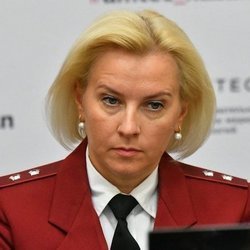Tatarstan close to achieving collective immunity, but 'there are reserves among Tatarstan citizens over 60 years old'
Theoretically, vaccinated people can spread coronavirus, but in practice, today in Tatarstan, there are no situations where the sources of COVID-19 infection would be vaccinated people. This was stated by Chief Sanitary Doctor of Tatarstan Marina Patyashina at an online conference on Instagram. According to her, 72% of the republic's residents and only 60% of all elderly people have been vaccinated today, although they are the ones at risk. In recent weeks, there has been a fragile downward trend in the number of new cases. At the same time, the Ministry of Justice of the Republic of Tatarstan states that all restrictive measures in Tatarstan were introduced by the republican authorities “according to the law”, and Aleksey Pesoshin, as the Prime Minister of the Republic of Tatarstan, was not obliged to sign the famous 208th resolution at all. At the same time, as if the coronavirus was not enough, the flu epidemic has also begun — for the first time in two years.
“A very fragile trend towards morbidity stabilisation”
Patyashina called the epidemiological situation in Tatarstan this autumn “extremely tense”. The increase in the incidence of coronavirus both in Russia as a whole and in the republic was observed over the past two months — in October and November. Moreover, in November, the incidence figures even exceeded the October figures “more than twofold”. Only in the last two weeks, Tatarstan has noted a “very fragile trend toward morbidity stabilisation” and reduce the number of new cases, said the head of the Tatarstan Rospotrebnadzor.
The figures indicating a decrease in the rate of increase in cases per week, which reached 38% in the “hottest time”, also inspire relative optimism. And only in the same last two weeks, the figures began to decline, eventually falling by 5% relative to the end of November and immediately by 8% in the first week of December.

Only two thirds of elderly Tatarstan citizens have been vaccinated so far
According to her, today the republic is approaching 80% vaccination coverage of adult population: 72% of Tatarstan citizens have been vaccinated. It remains to vaccinate about 300 thousand more people. However, among the elderly population (we are talking about people over 60 years old), the vaccination rates are still low, while the proportion of deaths among them is three times higher than among the younger adult population, Rospotrebnadzor of the Republic of Tatarstan drew attention. So far, only 60% of elderly Tatarstan citizens have been vaccinated — the reserve for vaccination is “sufficient”, Patyashina summed up.
At the same time, in addition to vaccination measures, restrictive measures have been introduced, including mandatory self-isolation of elderly residents of Tatarstan. The work of a number of institutions, in particular children's entertainment centres, is still completely prohibited. The operation of retail and catering facilities is prohibited from 11 pm to 6 am, with the exception of pharmacies and filling stations. The work of fairs, baths, saunas and children's visits to shopping centres unaccompanied by adults are prohibited “at night”. Visiting public places for unvaccinated persons or persons “without the status of those who have been infected with COVID-19" are also restricted.
“In Tatarstan, as you know, there is a category of “persons subject to mandatory vaccination”. I would like to say that this work is almost completed in the republic, although, summing up, I would like to note that there are still reserves among Tatarstan citizens over 60 years old, among those working in small businesses and among those who are 'in free mode'. These categories represent the main audience for us today [for mandatory vaccination]," Patyashina said.
“There is no signature of the prime minister!”: the Ministry of Justice told why Pesoshin did not sign under the 208th resolution
Tatarstan citizens, in response to restrictive measures and mandatory vaccination against coronavirus, flooded the Ministry of Justice of Tatarstan with appeals. As the first deputy head of the department, Aynur Galimov, said on 9 December, due to the difficult epidemiological situation and strict restrictive measures introduced in the republic, the ministry is receiving a large number of such letters every day.
“But I would like to say that all the measures introduced comply with the legislation," Galimov said, listing those federal laws on the basis of which the Cabinet of Ministers of the Republic of Tatarstan issued its October resolution.
Among them, Galimov named the Federal Law “On the protection of the population and territories from natural and man-made emergencies”. In accordance with the introduction of high-alert regime, state authorities and “restrictive measures are being taken”. On March 19, 2020, by the order of President of Tatarstan Rustam Minnikhanov, a “high alert mode” was introduced on the territory of the republic, according to which the government of the Republic of Tatarstan was ordered to “take and ensure restrictive measures”.
Secondly, there is the Federal Law “On the sanitary and epidemiological welfare of the population”, according to which the regions of Russia are empowered, based on the proposals of their chief sanitary doctors, to introduce and cancel restrictive measures on the territory of the subject. Finally, in addition to the above, Galimov assured that there are also decrees of the President of Russia, resolutions of the Government of the Russian Federation and the chief sanitary doctor of the Russian Federation.
“Thus, the regions have been given the authority to introduce restrictive measures on the territory of the subject," summed up the deputy minister of justice of the Republic of Tatarstan.
Interestingly, no less complaints are received from Tatarstan residents in connection with the direct resolution of the Cabinet of Ministers of the Republic of Tatarstan No. 208 “On measures to prevent the spread of the new coronavirus infection in the Republic of Tatarstan”.

“Practically, we do not see that vaccinated people are the sources of infection and disease”
Patyashina, in turn, responded to the attacks received on Instagram, where, for example, referring to the words of the head of the Rospotrebnadzor of the Russian Federation, Anna Popova, that “vaccinated people can spread coronavirus”, social network users asked questions: “Why, then, are there restrictions on the movement of the unvaccinated? So this is coercion to get vaccinated?"
“You all understand that the virus is new. And the study of it, although it is very active today, has not yet been completed. Theoretically, vaccinated people can spread the virus. But practically, we do not see that vaccinated people are the sources of infection and disease. That's why we set ourselves the task of vaccinating 80% of the population," she explained.
Patyashina also refuted the “fakes” that clinical trials of Russian coronavirus vaccines have not been completed, and therefore, some Tatarstan residents conclude that “illegal tests” are actually being conducted on vaccinated citizens. Clinical trials have been completed, she assured, in the part after which the introduction into civil circulation is allowed. Today, the Sputnik V vaccine has a certificate of state registration, and therefore you should not have any concerns about it.